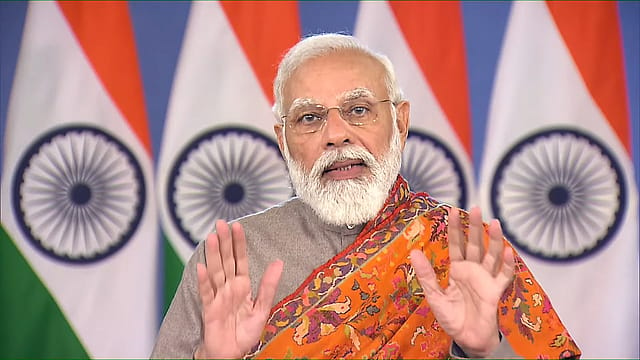Pvt innovation, investment keeping distance from agri sector: PM Modi
ADVERTISEMENT

The Prime Minister, in his post-budget webinar on ‘Agriculture and Cooperatives’ today, said private innovation and investment are keeping a distance from the agri sector, which leads to low participation of India’s youth in the agricultural sector compared to the other sectors. Drawing an analogy to the open platform of UPI, the PM talked about the Digital Public Infrastructure platform in the agriculture sector and noted the immense possibilities of investment and innovation in agri-tech domains.
He said every Budget in recent years has been called a budget for ‘Gaon, Gareeb and Kisan’. He said the agricultural budget, which was less than ₹25,000 crore in 2014, has increased to over ₹1,25,000 crore today.
India’s agricultural sector remained distressed for a long time after Independence because of the country’s dependence on the outside world for food security, he opined, adding that farmers transformed the situation. They did it by not only making the nation ‘atmanirbhar’ (self-sufficient) but also by being capable of exporting food grains.
“Today India is exporting many types of agricultural products,” the Prime Minister said. India’s goal should not be limited to rice or wheat when it comes to self-sufficiency or export, he said.
The PM talked about the introduction of accelerator funds for agri-tech startups and asked youths to move forward and achieve goals. India is home to more than 3000 agri-startups today compared to next to nothing 9 years ago, he said.
PM Modi gave examples of expenditures of ₹17,000 crore in 2021-22 for the import of pulses, ₹25,000 crore for the import of Value Added Food Products, and ₹1.5 lakh crore spent on the import of edible oils in 2021-22. He said the sum of all agricultural imports was about ₹2 lakh crore.
The Prime Minister touched upon the International Year of Millets and said that its international identity is opening a gateway to the global market for Indian farmers. “The country has now identified coarse grains as Shri Anna in this budget,” the Prime Minister said.
“A new revolution is taking place in the cooperative sector of India,” the Prime Minister said, adding that TDS will not be levied on cash withdrawals up to Rs 3 crore by cooperative societies.
Prime Minister Modi will address 12 post-budget webinars between 23rd February and 11th March to build on the “Saptarishi” priorities outlined in the Union Budget 2023-24. In his first address yesterday, he said India's push for green growth and energy transition has three main pillars -- increasing renewable energy production, reducing fossil fuels usage and taking the country towards a gas-based economy.
The PM said this year's budget, too, has "green credits" for industry and PM PRANAM for farmers. "This includes Gobardhan Yojana for villages vehicle scrapping policy for urban areas."
According to the PM, the budget will help make India a lead player in the "Global Green Energy" market, and the vehicle scrapping policy and green growth strategy are the two main aspects.